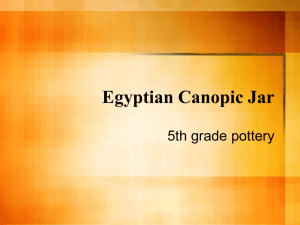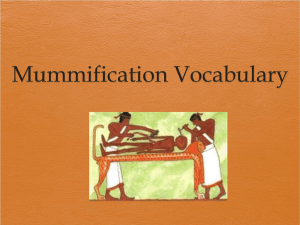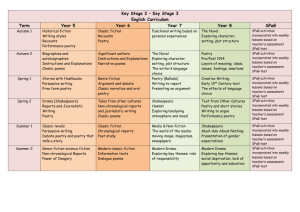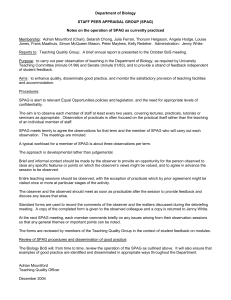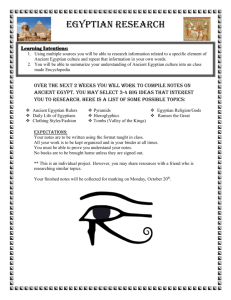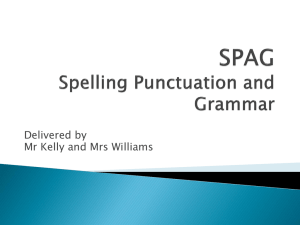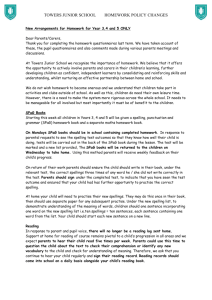Year 6
advertisement
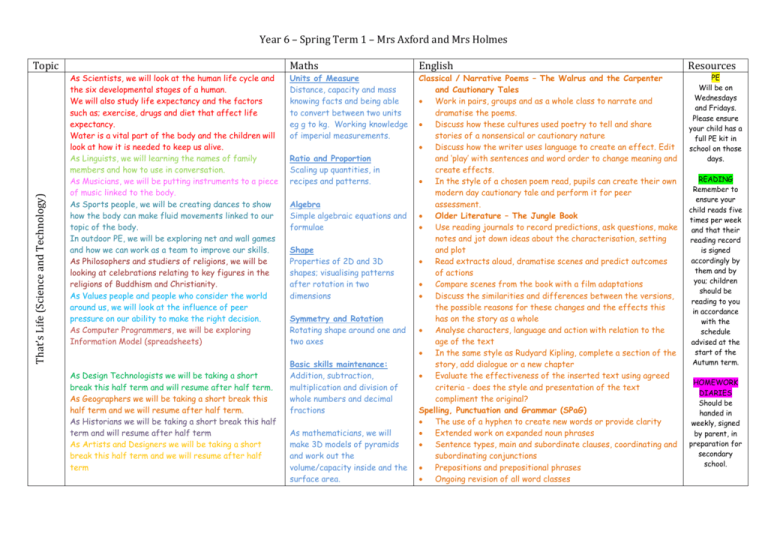
Year 6 – Spring Term 1 – Mrs Axford and Mrs Holmes That’s Life (Science and Technology) Topic As Scientists, we will look at the human life cycle and the six developmental stages of a human. We will also study life expectancy and the factors such as; exercise, drugs and diet that affect life expectancy. Water is a vital part of the body and the children will look at how it is needed to keep us alive. As Linguists, we will learning the names of family members and how to use in conversation. As Musicians, we will be putting instruments to a piece of music linked to the body. As Sports people, we will be creating dances to show how the body can make fluid movements linked to our topic of the body. In outdoor PE, we will be exploring net and wall games and how we can work as a team to improve our skills. As Philosophers and studiers of religions, we will be looking at celebrations relating to key figures in the religions of Buddhism and Christianity. As Values people and people who consider the world around us, we will look at the influence of peer pressure on our ability to make the right decision. As Computer Programmers, we will be exploring Information Model (spreadsheets) As Design Technologists we will be taking a short break this half term and will resume after half term. As Geographers we will be taking a short break this half term and we will resume after half term. As Historians we will be taking a short break this half term and will resume after half term As Artists and Designers we will be taking a short break this half term and we will resume after half term Maths English Resources Units of Measure Distance, capacity and mass knowing facts and being able to convert between two units eg g to kg. Working knowledge of imperial measurements. Classical / Narrative Poems – The Walrus and the Carpenter and Cautionary Tales Work in pairs, groups and as a whole class to narrate and dramatise the poems. Discuss how these cultures used poetry to tell and share stories of a nonsensical or cautionary nature Discuss how the writer uses language to create an effect. Edit and ‘play’ with sentences and word order to change meaning and create effects. In the style of a chosen poem read, pupils can create their own modern day cautionary tale and perform it for peer assessment. Older Literature – The Jungle Book Use reading journals to record predictions, ask questions, make notes and jot down ideas about the characterisation, setting and plot Read extracts aloud, dramatise scenes and predict outcomes of actions Compare scenes from the book with a film adaptations Discuss the similarities and differences between the versions, the possible reasons for these changes and the effects this has on the story as a whole Analyse characters, language and action with relation to the age of the text In the same style as Rudyard Kipling, complete a section of the story, add dialogue or a new chapter Evaluate the effectiveness of the inserted text using agreed criteria - does the style and presentation of the text compliment the original? Spelling, Punctuation and Grammar (SPaG) The use of a hyphen to create new words or provide clarity Extended work on expanded noun phrases Sentence types, main and subordinate clauses, coordinating and subordinating conjunctions Prepositions and prepositional phrases Ongoing revision of all word classes PE Will be on Wednesdays and Fridays. Please ensure your child has a full PE kit in school on those days. Ratio and Proportion Scaling up quantities, in recipes and patterns. Algebra Simple algebraic equations and formulae Shape Properties of 2D and 3D shapes; visualising patterns after rotation in two dimensions Symmetry and Rotation Rotating shape around one and two axes Basic skills maintenance: Addition, subtraction, multiplication and division of whole numbers and decimal fractions As mathematicians, we will make 3D models of pyramids and work out the volume/capacity inside and the surface area. READING Remember to ensure your child reads five times per week and that their reading record is signed accordingly by them and by you; children should be reading to you in accordance with the schedule advised at the start of the Autumn term. HOMEWORK DIARIES Should be handed in weekly, signed by parent, in preparation for secondary school. Year 6 – Spring Term 2 – Mrs Axford and Mrs Holmes Walk Like an Egyptian (Place and Time) Topic As Scientists, we will recap the earth and space and consider the Egyptians as Sun worshippers. As Linguists, we will be continuing family conversation. As Musicians, we will compose and chant with a clear beat to help motivate when moving large stones. As Sports people we will be creating and perform a sand dance. In outdoor PE we will continue to explore net and wall games and how we can work as a team to improve our skills. As Philosophers and studiers of religions we will continue to look at celebrations relating to key figures in the religions of Buddhism and Christianity. As Values people and people who consider the world around us we will use creativity when designing and making death masks and canopic jars As Computer Programmers, we will continue to look at Information Models (spreadsheets) As Design Technologists, we will use papier mache to mould an Egyptian God on the top of our canopic jars thinking about size and proportion As Geographers, we will learn about the county of Egypt and significant places. As Historians, we will learn about key individuals, Egyptian mythology and aspects of daily life As Artists and Designers, we will design canopic jars and paint them following Egyptian Styles. We will also design and make death masks Maths English Resources As Spring 1. Traditional Stories, Fables, Myths, Legends Try story telling as an art form and share own work with the class and share myths and legends from ancient traditions, including Egypt Explore the features of a myth and a legend Compare different versions of the same story - chart what changes, stays the same Storyboard a read version and dramatise a scene and explore motives, feelings and plot Create own mythical creatures, hero, setting - character and setting development- make models Use myths and legends playing cards to support story writing and telling Create a sustained piece of writing in paragraphs (thinking about keeping readers interest, the style being the same throughout) creating suspense Choral and Performance Share performance poetry on paper and in performance. Discuss the impact poetry has when it’s being performed. Identify the features of a ‘good’ performance poem. Give the children opportunities to work in pairs, small groups and independently to prepare, rehearse and present Recap on the features of poetry and explain how their inclusion within the performance impacts on the overall effect. Write alliterative and rhyming sentences, including onomatopoeia. Working in small groups, pairs or independently children can prepare, rehearse and perform their own poems to perform using a checklist of agreed criteria, which can be evaluated. PE Will be on Wednesdays and Fridays. Please ensure your child has a full PE kit in school on those days. In addition, general and targeted revision for SATs, to include: Patterns of shape and number Function machines Negative numbers Plotting and interpreting data from a variety of charts, graphs Reading unmarked scales and intervals Time and timetables Number - prime numbers, factors, square numbers, squares, fractions decimals and percentages Word calculations, including money and other units of measure Spelling, Punctuation and Grammar (SPaG) In SPaG the children will be revisiting aspects of story writing and sentence construction. Punctuation of sentences - accuracy and variety, including options to replace traditional full stops. Revision of all SPaG elements for SATs. Linked to our topic we will respond to messages using hieroglyphics and we will learn some Arabic phrases. READING Remember to ensure your child reads five times per week and that their reading record is signed accordingly by them and by you; children should be reading to you in accordance with the schedule advised at the start of the Autumn term. HOMEWORK DIARIES Should be handed in weekly, signed by parent, in preparation for secondary school planners.
